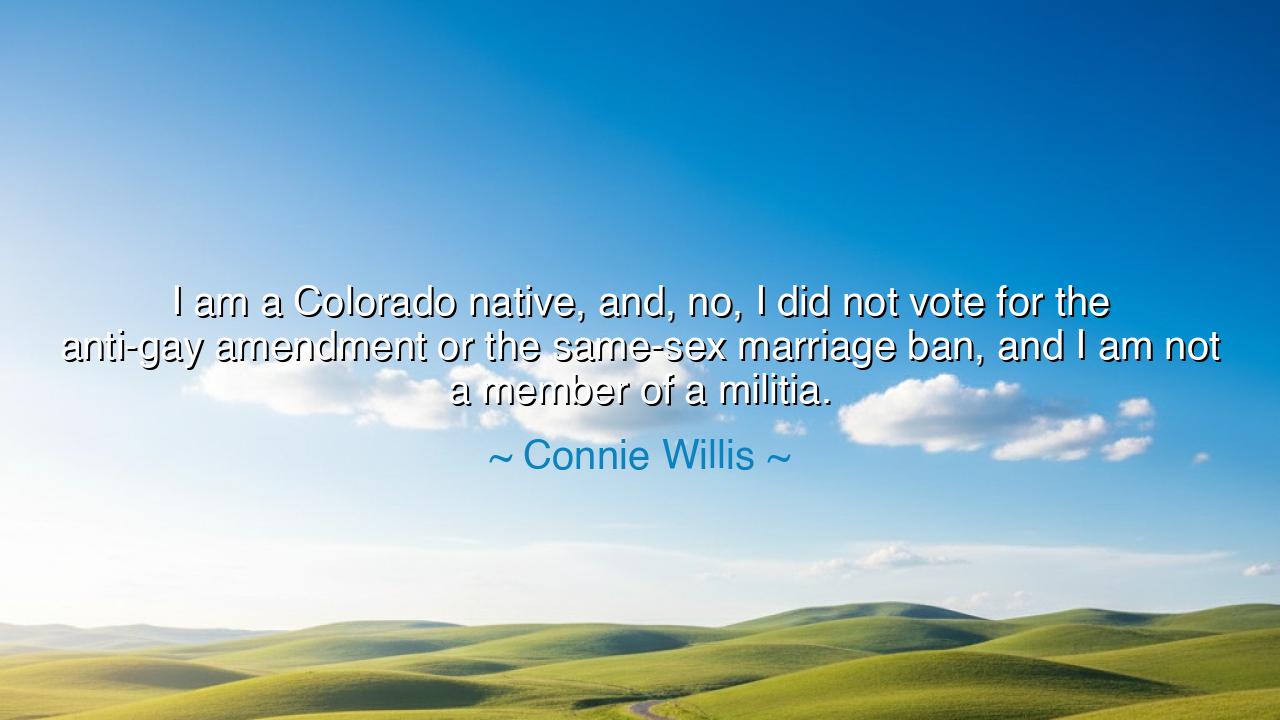
I am a Colorado native, and, no, I did not vote for the anti-gay
I am a Colorado native, and, no, I did not vote for the anti-gay amendment or the same-sex marriage ban, and I am not a member of a militia.






Hear, O listener, the voice of Connie Willis, mistress of stories and seer of truths, who declared with biting clarity: “I am a Colorado native, and, no, I did not vote for the anti-gay amendment or the same-sex marriage ban, and I am not a member of a militia.” This utterance, sharp with irony and edged with exasperation, was not merely a statement of identity but a defense against the burden of association. For she knew that to be from a place is often to be judged by the deeds of its people, and she refused to be counted among those who sought to chain love or who courted violence.
Her words arose in the shadow of history. In the early 1990s, the state of Colorado became infamous for Amendment 2, a measure that forbade cities and towns from passing protections for gay and lesbian citizens. To the watching world, Colorado became branded the “Hate State,” its mountains clouded by the shame of injustice. And in such a moment, voices of conscience like Willis felt compelled to speak: to proclaim that not all who shared the soil shared the sin. Her declaration was both a refusal and a witness—that one can love their homeland yet reject its injustice, one can be loyal to their roots without being bound to its errors.
The second part of her saying, “I am not a member of a militia,” reveals another burden of identity. For in that same era, armed militias rose across the American West, railing against government, often fueled by extremism and hate. To outsiders, Colorado became associated not only with anti-gay measures but with angry militias, men with guns who sought freedom in isolation rather than in justice. Willis, as both writer and citizen, would not allow her name to be confused with theirs. She claimed her identity with clarity: she was from Colorado, but not of these movements.
In these words, we hear the universal truth that people are often judged by the acts of their land, their tribe, their nation. So it was with Germans after the Second World War, who carried the shadow of Nazism whether or not they had embraced it. So it was with Southerners after the Civil War, many of whom despised slavery yet were marked by the rebellion of their neighbors. History teaches us that the sins of communities cling to the innocent, unless they speak out to separate themselves, to bear witness to another path.
Willis’s tone is not only defensive but also instructive. She shows that silence is dangerous, for silence allows injustice to be painted as universal. By speaking—by naming herself apart from the anti-gay amendment, apart from the same-sex marriage ban, apart from militias—she draws a line. She shows that individuals can resist the collective stain, and in so doing, they light a path for others who feel trapped by the sins of their community.
O children of tomorrow, learn this: you are not only judged by your own deeds but also by the deeds of the places and groups you belong to. If you would be known for truth, you must speak truth. If you would be free of the taint of injustice, you must denounce it openly, lest silence bind you to it. Like Willis, be unafraid to say, “Yes, I am of this people, but I do not walk in every path they choose.”
What then must you do? When your community errs, speak. When your nation stumbles, rise to declare what you will not support. Love your homeland, but love justice more. Refuse to let your identity be swallowed by the errors of others. In this way, you honor both your place and your conscience, showing that true loyalty is not blind obedience but the courage to call one’s people to higher ground.
Thus the words of Connie Willis endure: “I am a Colorado native… but I did not support injustice, nor violence.” In them lies a timeless lesson: that identity is not destiny, that the soul can rise above the sins of its soil, and that by declaring what we are not, we help build a world where what we are—human, equal, free—can shine without shame.






AAdministratorAdministrator
Welcome, honored guests. Please leave a comment, we will respond soon